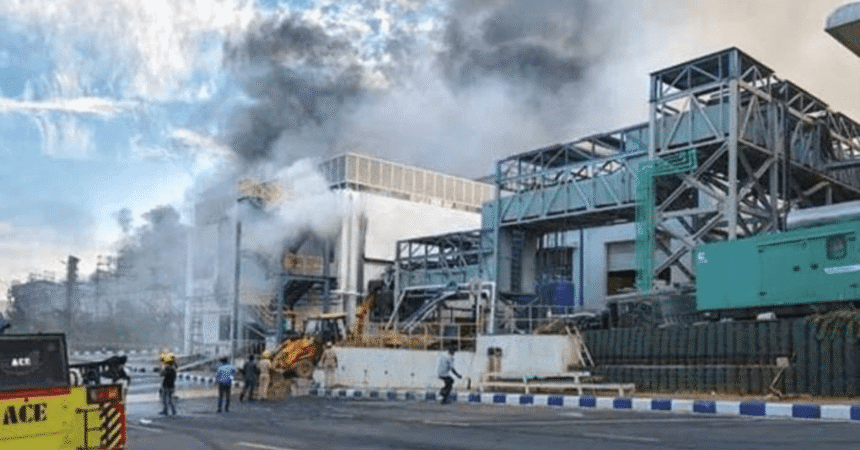Introduction
In recent years, India has emerged as a significant player in the global technology manufacturing landscape, particularly as companies seek to diversify their supply chains away from China. Apple’s strategy to broaden its production base in India is a prime example of this shift. However, this transition has not been without its challenges. A recent fire at Tata Group’s iPhone components factory in Tamil Nadu has once again highlighted the vulnerabilities in Apple’s supply chain. This incident, while unfortunate, also underscores the resilience and adaptability of both Apple and the Indian manufacturing ecosystem.
The Incident: A Fire Disrupts Production
The fire at Tata Group’s facility, which occurred over the weekend, temporarily halted operations at a crucial site responsible for producing components for iPhones. This incident is not isolated; it follows two other significant fires at factories owned by Taiwanese suppliers Pegatron and Foxlink last year. Each disruption raises concerns about potential delays in production and shipments, particularly for older iPhone models, as analysts speculate on the long-term impacts on Apple’s supply chain in India.
Tata Group has responded swiftly to the crisis, with a spokesperson stating that they have been working diligently to identify the cause of the fire and support their team. While partial operations are set to resume, the company has yet to confirm when full production will be restored or if there will be any impact on shipment timelines.
Apple’s Strategic Shift to India
India has become an attractive alternative for Apple, offering a combination of a skilled workforce, competitive labor costs, and a growing domestic market. This strategic shift is part of Apple’s broader strategy to insulate itself from geopolitical tensions, particularly those involving the United States and China.
By investing in India, Apple is not just diversifying its supply chain; it is also tapping into the country’s vast consumer base. India’s burgeoning middle class and increasing smartphone penetration present a lucrative opportunity for Apple, which has historically been reliant on the Chinese market for both production and sales.
The Broader Context: Geopolitical Factors
The move to expand manufacturing in India also reflects the broader geopolitical landscape. Tensions between Washington and Beijing have intensified in recent years, prompting many companies to reassess their reliance on Chinese manufacturing. Trade tariffs, regulatory hurdles, and concerns over supply chain vulnerabilities have driven companies like Apple to seek alternatives.
India’s government has been proactive in positioning the country as a manufacturing hub. Initiatives such as “Make in India” aim to attract foreign investment and promote local manufacturing. For Apple, the combination of a supportive government policy environment and a growing local market makes India an attractive destination for expanding its production capabilities.
Recent Developments in India’s Tech Manufacturing Sector
Beyond Apple, other tech giants are also investing in India’s manufacturing capabilities. Google, for instance, has started local production of its flagship Pixel 8 smartphone. This trend reflects a growing confidence in India’s ability to serve as a viable manufacturing alternative to China.
Foxconn, one of Apple’s principal assemblers, is in the process of establishing a major phone assembly plant near Bengaluru, reinforcing its commitment to Indian manufacturing. As these companies invest in local production facilities, the infrastructure and ecosystem for tech manufacturing in India are expected to strengthen.
Tamil Nadu: A Hub for High-Tech Manufacturing
Tamil Nadu has emerged as a focal point for high-tech manufacturing in India. The state’s government has worked diligently to cultivate a favorable business environment, attracting both domestic and international investment. Recent commitments, such as nearly $900 million secured by state chief minister MK Stalin during his tour of the United States, further underscore Tamil Nadu’s potential as a manufacturing hub.
Key deals with companies like Nokia and PayPal to establish research and AI development centers highlight the state’s ambitions to not only attract manufacturing but also foster innovation. This emphasis on technology and research is critical for creating a robust ecosystem that supports the future growth of the tech industry in Tamil Nadu.
Challenges and Opportunities
While the recent fire at Tata’s facility serves as a reminder of the vulnerabilities in Apple’s supply chain, it also presents an opportunity for reflection and improvement. The incident underscores the importance of risk management and contingency planning in supply chain operations.
To mitigate the impacts of such disruptions, Apple and its suppliers may need to invest in more comprehensive safety measures and operational protocols. Building a resilient supply chain requires not only technological investment but also a cultural shift towards proactive risk management.
Moreover, the fire incident could prompt Apple to further diversify its supplier base within India. By engaging multiple suppliers and establishing redundancy in its supply chain, Apple can better insulate itself from future disruptions.
The Future of Apple in India
Looking ahead, Apple’s commitment to India is likely to deepen. The company has announced plans to manufacture AirPods locally at a facility operated by Foxconn, further diversifying its production capabilities within the country. This expansion is expected to create jobs and foster local talent, contributing to the growth of the Indian economy.
Moreover, as Apple continues to localize its production, the company will likely invest in training programs and partnerships with local educational institutions to ensure a skilled workforce. Such initiatives not only benefit Apple but also contribute to the broader goal of enhancing India’s manufacturing capabilities.
The Role of Government Policy
The Indian government plays a crucial role in shaping the future of manufacturing in the country. Policies that encourage foreign investment, streamline regulatory processes, and enhance infrastructure will be pivotal in attracting more companies like Apple.
Furthermore, as the government focuses on innovation and technology, initiatives that promote research and development will be vital for ensuring that India remains competitive in the global market. Collaboration between the government and private sector will be essential to address challenges and leverage opportunities in the tech manufacturing space.
The recent fire at Tata Group’s iPhone factory serves as a poignant reminder of the challenges faced by companies in today’s complex supply chain landscape. However, it also highlights the resilience of both Apple and the Indian manufacturing ecosystem.
As India positions itself as a critical hub for tech manufacturing, the combination of a skilled workforce, government support, and the presence of major players like Apple and Foxconn will play a crucial role in shaping the future of the industry.
While challenges remain, the opportunities for growth and innovation are significant. With a commitment to local manufacturing and a focus on risk management, Apple and its partners are poised to thrive in India, contributing to the country’s economic development and transforming its position in the global tech landscape.
In this evolving scenario, it is clear that the partnership between Apple and India is not just about production; it is about building a sustainable and resilient future in a rapidly changing world.







